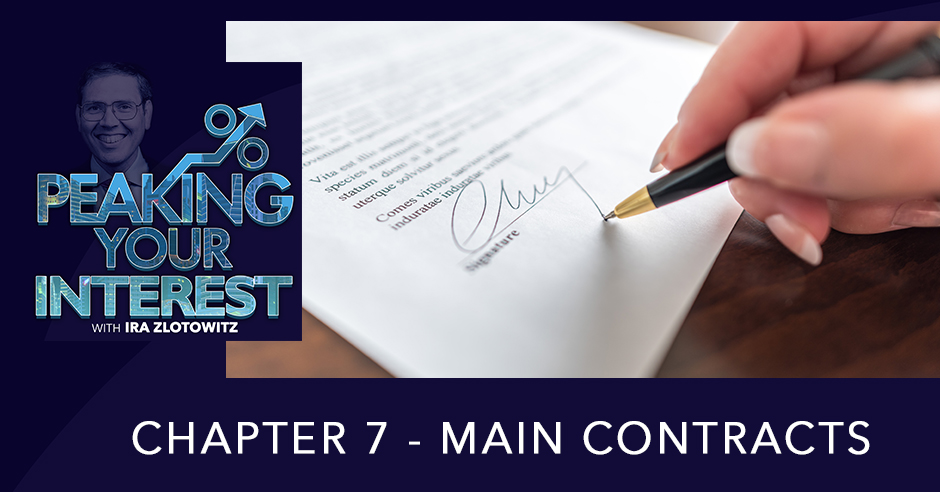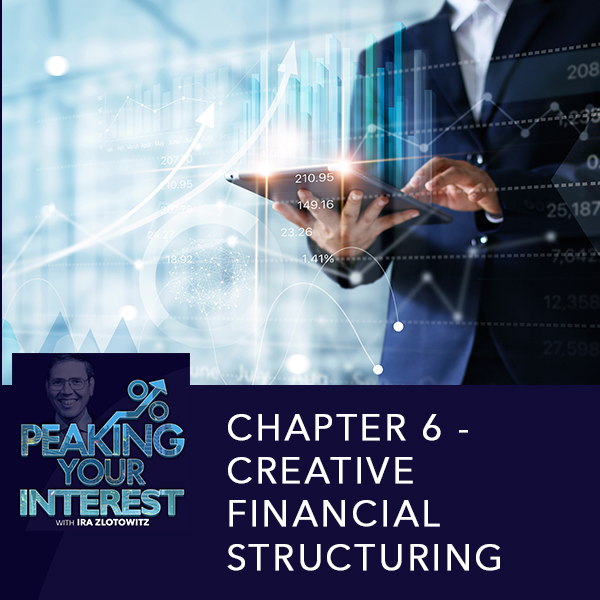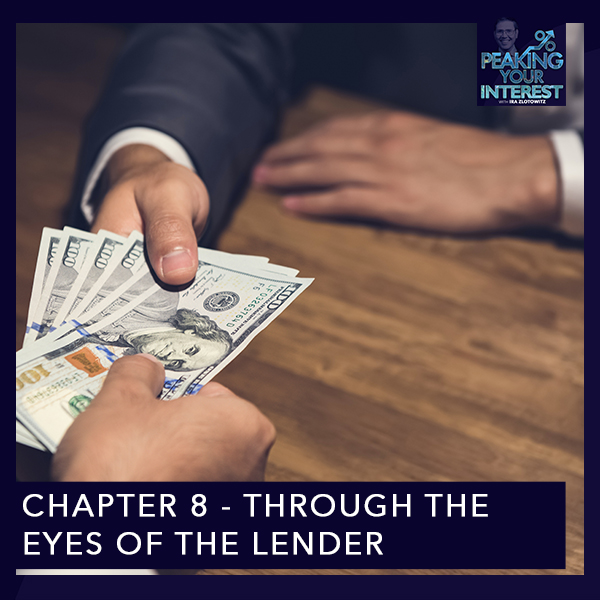Chapter 7 – Main Contracts
- On March 25, 2020

Working in real estate, you encounter different sorts of people with their own kinds of practices, but the one thing that connects all of them is that they function under the purview of documents that, by law, they are bound to. Working with contracts can be a bit of a struggle if you’re not familiar with them, but that is why there are people out there whose jobs entail helping others navigate the often muddy world of contracts. Ira Zlotowitz discusses the essentials of working under these documents, and which ones you should be aware of. If you’re new to contracts, then you definitely shouldn’t miss this as Ira has plenty to share that will help make contracts a lot less overwhelming.
—
Listen to the podcast here:
Chapter 7 – Main Contracts
We’re going to do Chapter 7. It’s probably the shortest, but to a certain extent the most important. The reason why it’s the shortest is that almost all the work on Chapter 7 is not done by you. The work on Chapter 7 is being done by your legal counsel. More for you to get an overview idea of what’s going on versus the specifics. Chapter 7 is what contracts are needed to move from business to closing? You want to start this, you’re a businessman. You want to go there, become a real estate person, work the transaction, get at the closing. What do you need?
Before I go into it, I want to give a little bit of an introduction to this point. My brother is an amazing attorney. He might bother some attorneys. You have to remember an important thing. You chose to become a real estate investor. You’re an entrepreneur spirit that you are willing to go ahead and take a certain level of risk versus reward and go into it. There’s a lot of risks to it. You have to remember that your lawyer is not your business advisor. Your lawyer’s job is to protect you. Protect you in two ways, make sure that you understand your risks and that when you’re ready to move forward, you’re legally protected. That’s it. Can they sometimes do more? Could they help out? Yes, but they’re not the end-all.
They’re not the reason why you should be buying a property or not. You are the reason why you are buying a property or not. If you’re not comfortable, don’t buy real estate. The way it should work is you should decide, “I like this building for $2 million.” I want to buy it. I want to legally make sure that I’m going to go into the contract and I’m not going to lose my money. I can close, get an attorney. I want to raise equity, get an attorney. I want to negotiate the term sheets and the contracts, get an attorney. The attorney should flag you on things you don’t know.
When faced with the decision, it’s yours. For example, I use these two examples all the time. I was talking to a client and I’m telling a client that I’m sorry, the bank won’t allow him a certain clause that he wants to be put in. He says, “I’m sorry if the bank won’t allow it, I’m not going to take the loan. My attorney says I shouldn’t take it.” I said, “Interestingly enough, interesting.” The interest rate on his deal at that time is 4%. I said “I could get the bank, if you’re willing to move forward, to only charge 3%.” He goes “From 4% to 3%? I’m moving forward.” I said, “Get your attorney.” What’s the point of the story? It’s a calculated risk to make a decision. At 4%, maybe it didn’t make sense to take the risk. At 3% it did, but as to realize your attorney can’t be your end-all. You have to be your end-all by listening to everyone around you. Be a student of business, ask questions, understand, but it’s like everything is a calculated risk.

Working With Contracts: The very first contract you need is the contract of sale – the contract between the buyer and seller that makes sure that everything promised will be delivered.
Number two, I did a deal for a major attorney in New Jersey. He invested in over 100 deals himself. I remember bringing him the term sheet. He takes the documents, the commitments. He looks at it, checks the interest rate, checks the loan amount, checks the prepayment penalty. He checks all the business points and then he signs. He’s negotiating the clauses. He says, “Ira, don’t tell this to my clients that it’s me, but I learned after all my life in real estate, if you pay the mortgage, you’re good. If you don’t pay the mortgage, you have a problem. At the end of the day, what I care for is to make sure the business terms are clear. I’m comfortable and he moved forward.
With that, I want to move more into the specifics of this chapter. I want to bring out an important point that real estate, you should need a real estate attorney. A real estate attorney can represent you in all the steps in the process. It’s important that you understand that if you are putting money together and taking money from other people, whether it be a family member, a friend, a partner, you’re doing something online, it doesn’t make a difference.
If you are taking money from somebody and you’re putting them into an entity that’s going to buy real estate, that is called security. I’m not giving you an education on security law, but that’s no longer real estate. That part is similar to buying a stock, buying a company. It happens to be what you’re buying is a piece of real estate. This whole area is not for you and your real estate attorneys to discuss. You need to get yourself a securities lawyer. That’s what you need to get. We at the office, anytime we have securities laws, we ask Joseph Bergman, that’s who we ask the questions to. That world, we, I make business decisions on his comments but never legal decisions. Someone says, “Don’t worry about it.” I turn to Joseph, “Joseph, can you please explain to me what the risks are rewards, not rewards as much as the risks. What am I going into? What’s the liability?” and then I make a decision.
There are some business practices as a company, we have to change because of the law. There are other people who said, “Don’t worry.” I could always find people who would tell me, “Don’t worry.” If I made my decision and I’m going with Joseph Bergman, I’m trusting his opinion. He’s the law. It’s going back in the context before he’s not making my business decisions for me. He’s going to tell me, “Ira, by doing this, you run the risk of A, B and C. If the risk of A, B and C can generate me $1 or the reward could generate me $1, the risk can only cost me $0.20 and it’s within the law, but it might be a penalty. I might take that risk.
Your lawyer is not your business advisor. Click To TweetIf he does the flip side, I’m not going to take the risk. I take the facts by him when I weigh it. If you’re going out there, realize you want to take money from someone and the securities laws are going to change crowdfunding, all these laws are starting to change. They’re going to change drastically over the next few years. People think not, I think drastically. If they’re going to keep changing and evolving, you want to make sure they have a securities attorney. As I’m going to go through the steps, there’s a real estate attorney and a securities attorney.
Let’s start with number one. The first contract you need is a contract of sale. That’s the contract between the buyer and the seller. You’re going into contract. You’re going to have to put up a deposit. You want to make sure that what you promised is going to be delivered. If not, you can get your deposit back. The seller wants to be sure you’re not wasting his time. If he’s ready to deliver, you’re going to close. If not, he keeps your deposit. There are negotiations early on. Who drafts this? It’s drafted by a real estate attorney, but who drafts it? Do you draft it? The seller drafts it or the buyer.
By law, you don’t need an attorney to represent you here. It’s great practical advice going into an area. You take money from people investing money. You want to make sure you’re protected. Hire a real estate attorney. When you go out there in this transaction, who should draft the contract? Different states, it’s not by law, does have different customs in how they do it. Does the seller draft it and the buyer works off that document? Does the buyer put his offer in writing and the buyer drafts it? It makes the most sense that a seller should draft it.
The reason why sellers should draft this because the seller knows what he’s selling. The order would be if the seller is drafting it, they’ll have a conversation. A buyer would say, “I’m willing to pay you $12 million, $18 million, $14 million, $4 million, $40 million,” whatever the terms are. The seller goes to his attorney and hires an attorney to draft a contract that says, “I am willing to sell you this and this property for this price.” There are pages and pages of all the what-ifs and liabilities, who’s responsible, etc. He sends it out over to the seller. He sends over to the buyer with a certain amount of time for the buyer. It says, “If you execute this in a certain amount of days, these are the contract,” and usually the two attorneys go back and forth and negotiate terminology.

Working With Contracts: You want to get an attorney who really understands contract law and is going to read the nuances of the language to make sure he or she can deal with some of the what-ifs.
There are already so many case laws. What happens if during this period the seller changes his mind and wants to sell to someone else? He realized $10 million. He has an offer from someone else for $14 million, could he back out what’s called the contract? This is when all the fights in real estate start here. It’s a real estate lawyer who usually understands litigation, but in most cases, it’s not litigation. I would venture to say 99% of all contracts, they go on contract. It ends up being resolved between the two attorneys, work everything out that has to be worked out. The seller has an attorney, the buyer’s attorney, that’s called the contract of sale.
The second contract has to deal with this JV operating agreement, the Joint Venture operating agreement. The securities lawyer should be involved to draft the agreement between you and your partners and your investors and everyone else that’s in the process. Who’s putting up money into this deal to make sure that it protected legally regular protection as far as the contract law that the agreements are fine. Plus, more importantly, you’re filing securities law. By securities law, they can dictate. You have to take money from accredited investors, non-accredited investors. What is a credit investor? Are the laws changing? Can I publicize the deal? Can I pay a commit?
Whatever’s going on in the process, you want to go out and get it done. I touched upon and talking to you now about paying a commission. When it comes to paying a commission, there are three commissions that get paid this early on in the transaction. It’s who brings money to the table. There’s a commission to the person who brought the deal to the table, which in effect brought money to the seller. You have to be a real estate broker. You have to have a broker’s license. There’s the mortgage broker. There’s no licensing for mortgage brokering, but you have to be a mortgage broker. I bring money. I get paid a commission for bringing the money.
The third commission could be to someone who helps you raise equity on the transaction. In that deal, it’s called an equity broker, but that person has to be licensed, a securities license. I said, “What do you do? I raise money. What do you do? I introduced friends and family to the people. Do you get a commission? Yeah. Are you licensed? No.” If you have no license, it’s called a consulting. Let me tell you something. It’s not called any of that. It’s called illegal. If the Securities Exchange came after you, you’re going to be in trouble. The thing that gets me most nervous now in the market is that real estate is doing amazing. There’s always a correction in the market at some point.
If you're paying your mortgage, the only thing you care about is the business terms. Click To TweetWhen the next correction comes down and people lose money, it gets opened up who they took money from, the person pays a commission. What I am led to understand and believe that if you paid a commission illegally to a broker to raise money, the person who gave you the money, their money becomes a personal guarantee back to the buyer of real estate. Here I could think I’d bought a great deal, $10 million building. I raised $2 million. I took a loan of $8 million. Non-recourse, the market corrects itself. God forbid, there is a problem and I’m able to walk away.
I paid someone illegally to bring me money in from Joe and Joe gave me $500,000. Joe has the right to personally ask me back for the money because that whole transaction was illegal, which is a little bit unfair. If the deal weren’t great, Joe wants his returns, he’s the pawner. If it blows up, he has a right to say, “Legally, you weren’t able to take the money.” I want to stress this. It’s very important. It’s security law issues. It’s not real estate law. Don’t risk it. Make sure you spend the money to get good counsel to start with upfront at this stage.
The next part of the process is you go to a mortgage broker, go to the bank, go bring it to a bank. We’ll get you a term sheet, letters of intent. I tell people early on, a letter of intent, you have someone representing you. If you’re using a mortgage broker, I wouldn’t advise you. I can’t tell you what to do. I know myself that if I was running my own deal or if my own sibling asked me, “I’m taking out a mortgage. I’ll hire an attorney to review the term sheet.” I would say no, but if you’re going direct to a bank and there’s no one in between, you maybe have an attorney review it at that time. Don’t spend too much energy there because at the end of this is, there are many outs. It doesn’t have to happen anyway. Some idea that if the deposit is refundable, some terminology I wouldn’t focus, not worth the legal fees for what they could benefit you this early on in the game.
However, once the process goes down and the bank issues you a commitment, bank issues closing documents, basically a commitment is that, “We underwrote this loan. We’re ready to lend you the $8 million. These are the terms and as long as you sign it, we’ll move to closing,” and whatever steps are in the process. That document you’re going to be now married to this lender for the life of this loan. You want to make sure that in this document you have great legal representation. This is where you need a good attorney to make sure that you’re protected.

Working With Contracts: Attorneys get paid by the hour, so the attorney’s job is not only to protect you, but they’re motivated to spend more time trying to do so.
Going back to my story before, the guy signed the document, it’s fine he signed it. You need an attorney. My recommendation is you read it. I have a client of mine who every document that he signs, he doesn’t trust anybody. It’s trust and verify. He says like in the Army, “Go trust and verify.” He reads every word. It has to make logical sense. If he can’t, he says to the bank, “Give me an example. You’re saying this is the penalty. It sounds complicated. Make it for a third-grader. I’m not that smart. Write it out for me.” He puts everything clearly in writing.
In his case, he’s having an attorney to make sure that another set of eyes and legally that everything is done right. For the most part, if you read it yourself and you understand that it makes sense to do everything, you need an attorney not as a rubber stamp but just to double-check. If you don’t have the time, if it’s not your expertise. Some people want to go to contracts. You want to get an attorney who understands contract law and is going to read the nuances to make sure to deal with some of the what-ifs.
Remember going back to what this attorney in New Jersey told me, “If you’re paying your mortgage, the only thing you care about is the business terms. If you’re not paying the mortgage, there is almost nothing you could negotiate here.” Non-recourse or recourse, that’s a business term. You agree to a personal guarantee, a non-personal guarantee. I meet people who want to negotiate. Sometimes it’s the craziest things. Remember the attorney gets paid by the hour. Not only is the attorney’s job to protect you, but they’re motivated to spend more time trying to protect you. Your job is to draw a line in the sand and say, “Enough is enough.”
I find the greatest attorneys are the ones that are able to tell the client a calculated a risk, and from their end of it say the calculated risk, “Tell them up front I could negotiate this for you, but practically speaking, look how much money you’re going to spend. Is it worth that effort? Would they go the opposite way?” When I meet clients who are married to their attorneys and saying this attorney on them, “Make a move with Adam,” it’s the attorney that genuinely has the client’s best interest as if it’s the client’s money, not just being a transaction.
I find most attorneys to be amazing, but the amazing part of most attorneys is to remember their job is to give you the flag, this information to you. The bank commitment to closing decks. The other documents that exist for the most part are during the life of owning the building, which is called leases. It’s between the landlord and the tenant. It’s an apartment building. Typically, it’s standard leases, a few modifications where it gets complicated sometimes if you have a commercial space. You have a larger tenant. It’s not a three-year lease. You could be signing a 10, 15-year lease.
The tenant and the landlord want to make sure they’re protected in all a bunch of scenarios. Is there a template you start with? There are terms that get negotiated back and forth. Typically, what I found to be the most successful in negotiations is that the principal. In litigation, an attorney is not allowed to talk to the other parties’ clients. They have to go through the attorneys. Over here, anyone could talk to each other. I found that the most productive ways to get transactions done, when there’s a broker involved, the broker could play this role in the middle.
When there’s no broker involved, when negotiating the final terms is that you better have the attorney talk to the other attorney for one or two rounds, then have the principals talk or through the broker talk to hammer the differences. Remember, each attorney wants to show the value to their boss, to show their client, “See what I got for you.” When many times the clients don’t care as much and especially if it’s going to keep costing them legal fees. I say let the attorney go 1 or 2 rounds, find out where the differences are in business terms, have one phone call between the two principals.
Bound to knock off a ton of those issues and then let the attorney go another round the two and the same thing. That’s what I found the most efficient balance back and forth. I’m giving general advice. You have to have specifics. If you’re someone that doesn’t have the ability to read documents, you need a certain type of attorney. If you’re busy, you’re not going to focus on, you need a certain type of attorney. The general process is what I’m able to go ahead and give over to you.




0 Comments